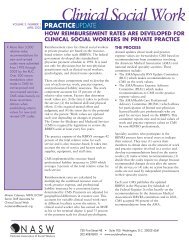NASW Standards for Social Work Case Management - National ...
NASW Standards for Social Work Case Management - National ...
NASW Standards for Social Work Case Management - National ...
- No tags were found...
Create successful ePaper yourself
Turn your PDF publications into a flip-book with our unique Google optimized e-Paper software.
N A T I O N A L A S S O C I A T I O N O F S O C I A L W O R K E R SN A S WS t a n d a r d s f o r<strong>Social</strong><strong>Work</strong> <strong>Case</strong><strong>Management</strong>
N A S WS t a n d a r d s f o r<strong>Social</strong><strong>Work</strong> <strong>Case</strong><strong>Management</strong>
<strong>National</strong> Association of <strong>Social</strong> <strong>Work</strong>ersJeane W. Anastas, PhD, LMSWPresidentElizabeth J. Clark, PhD, ACSW, MPHChief Executive Officer<strong>Social</strong> <strong>Work</strong> <strong>Case</strong> <strong>Management</strong><strong>Standards</strong> Expert PanelLinda Aufderhaar, MSW, LCSW, CCMBrian Giddens, LICSW, ACSWLea Ann Holder, MSW, LCSWSharon Mass, PhD, LCSW, C-ASWCMJun Matsuyoshi, LCSW-R, ACSWDavid Moxley, PhD, ACSW, DPARichard Rapp, PhD, MSW, ACSWNelly Rojas Schwan, PhD, LCSW, ACSWPhyllis Solomon, PhD, LSWMichelle Stefanelli, DCSW, LCSW, C-ASWCM<strong>NASW</strong> StaffTracy R. Whitaker, DSW, ACSWChris Herman, MSW, LICSW©2013 <strong>National</strong> Association of <strong>Social</strong> <strong>Work</strong>ers.All Rights Reserved.
Contents4 <strong>Standards</strong> <strong>for</strong> <strong>Social</strong> <strong>Work</strong> <strong>Case</strong> <strong>Management</strong>7 Introduction8 Background12 Goals of the <strong>Standards</strong>13 Definitions17 Guiding Principles19 <strong>Standards</strong> with Interpretations19 Standard 1: Ethics and Values22 Standard 2: Qualifications24 Standard 3: Knowledge28 Standard 4: Cultural and Linguistic Competence30 Standard 5: Assessment34 Standard 6: Service Planning, Implementation,and Monitoring38 Standard 7: Advocacy and Leadership40 Standard 8: Interdisciplinary and InterorganizationalCollaboration42 Standard 9: Practice Evaluation and Improvement44 Standard 10: Record Keeping47 Standard 11: <strong>Work</strong>load Sustainability49 Standard 12: Professional Development and Competence51 References55 Acknowledgments
<strong>Standards</strong><strong>for</strong> <strong>Social</strong> <strong>Work</strong> <strong>Case</strong> <strong>Management</strong>Standard 1. Ethics and ValuesThe social work case manager shall adhere toand promote the ethics and values of the socialwork profession, using the <strong>NASW</strong> Code of Ethicsas a guide to ethical decision making in casemanagement practice.Standard 2. QualificationsThe social work case manager shall possess abaccalaureate or advanced degree in social workfrom a school or program accredited by theCouncil on <strong>Social</strong> <strong>Work</strong> Education; shall complywith the licensing and certification requirementsof the state(s) or jurisdiction(s) in which she orhe practices; and shall possess the skills andprofessional experience necessary to practicesocial work case management.Standard 3. KnowledgeThe social work case manager shall acquire andmaintain knowledge of current theory, evidencein<strong>for</strong>medpractice, sociohistorical context, policy,research, and evaluation methods relevant to casemanagement and the population served, andshall use such in<strong>for</strong>mation to ensure the qualityof case management practice.Standard 4. Cultural and Linguistic CompetenceThe social work case manager shall provide andfacilitate access to culturally and linguisticallyappropriate services, consistent with the <strong>NASW</strong>Indicators <strong>for</strong> the Achievement of the <strong>NASW</strong><strong>Standards</strong> <strong>for</strong> Cultural Competence in <strong>Social</strong><strong>Work</strong> Practice.Standard 5. AssessmentThe social work case manager shall engage clients—and, when appropriate, other members of clientsystems—in an ongoing in<strong>for</strong>mation-gatheringand decision-making process to help clientsidentify their goals, strengths, and challenges.Standard 6. Service Planning, Implementation,and MonitoringThe social work case manager shall collaboratewith clients to plan, implement, monitor, andamend individualized services that promoteclients’ strengths, advance clients’ well-being,4
and help clients achieve their goals. <strong>Case</strong>management service plans shall be based onmeaningful assessments and shall have specific,attainable, measurable objectives.Standard 7. Advocacy and LeadershipThe social work case manager shall advocate <strong>for</strong>the rights, decisions, strengths, and needs ofclients and shall promote clients’ access toresources, supports, and services.Standard 8. Interdisciplinary andInterorganizational CollaborationThe social work case manager shall promotecollaboration among colleagues and organizationsto enhance service delivery and facilitate clientgoal attainment.Standard 9. Practice Evaluation and ImprovementThe social work case manager shall participatein ongoing, <strong>for</strong>mal evaluation of her or hispractice to advance client well-being, assess theappropriateness and effectiveness of services andsupports, ensure competence, and improve practice.Standard 10. Record KeepingThe social work case manager shall documentall case management activities in the appropriateclient record in a timely manner. <strong>Social</strong> workdocumentation shall be recorded on paper orelectronically and shall be prepared, completed,secured, maintained, and disclosed in accordancewith regulatory, legislative, statutory, andorganizational requirements.Standard 11. <strong>Work</strong>load SustainabilityThe social work case manager shall responsiblyadvocate <strong>for</strong> a caseload and scope of work thatpermit high-quality planning, provision, andevaluation of case management services.Standard 12. Professional Development andCompetenceThe social work case manager shall assumepersonal responsibility <strong>for</strong> her or his professionaldevelopment and competence in accordance withthe <strong>NASW</strong> Code of Ethics, the <strong>NASW</strong> <strong>Standards</strong><strong>for</strong> Continuing Professional Education, and thelicensure or certification requirements of thestate(s) or jurisdiction(s) in which the socialworker practices.5
Introduction<strong>Case</strong> management dates its development to theemergence of the social work profession andremains integral to 21st-century social workpractice. According to <strong>NASW</strong>’s benchmarkstudy of licensed social workers in the UnitedStates, case management is a component ofmany social work jobs, and “significant numbersof social workers report spending more than halftheir time” on case management responsibilities(Whitaker, Weismiller, & Clark, 2006, p. 19).Nurses and other professionals also practice casemanagement, and peer counselors (oftenreferred to as peer support specialists) have begunto play a role in the field.More than a century after its emergence, casemanagement has garnered renewed attention.Amid mounting constraints on both public andprivate funding <strong>for</strong> education, health care,housing, and social services, coordination ofservices is increasingly perceived as a strategyto improve service quality and outcomes whiledecreasing costs (Brown, 2009; Centers <strong>for</strong>Medicare & Medicaid Services, 2011;Silow-Carroll, Edwards, & Lashbrook, 2011;U.S. Department of Veterans Affairs, 2011).At the same time, additional researchdemonstrating the effectiveness of various casemanagement models with specific populationsis needed (Agency <strong>for</strong> Healthcare Research andQuality, 2011; Culhane, Parker, Poppe, Gross,& Sykes, 2007; Vanderplasschen, Wolf, Rapp, &Broekaert, 2007). Moreover, with the growingfocus on job delegation (Institute of Medicine,2008), tasks previously per<strong>for</strong>med by casemanagers in some settings are being divided7
among multiple personnel, including volunteers(Robert Wood Johnson Foundation, 2009).Within this context, social work case managersface both opportunities and challenges. Withits strengths-based, person-in-environmentperspective, the social work profession is welltrained to develop and improve support systems(including service delivery systems, resources,opportunities, and naturally occurring socialsupports) that advance the well-being ofindividuals, families, and communities.Furthermore, social workers have longrecognized that the therapeutic relationshipbetween the practitioner and the client plays anintegral role in case management. This expertisepositions the social work profession as a leaderwithin the field of case management. However,such leadership requires not only the integrationof direct practice skills and administrativestrategies, but also continued developmentof the evidence base <strong>for</strong> social work casemanagement. These standards are designed toenhance social work case management and tohelp the public understand the professionalsocial work role in case management.BackgroundThe profession of social work and the practiceof case management emerged simultaneously inthe United States during the late 19th and early20th centuries. Fueled by poverty and othersocial problems associated with industrialization,urbanization, immigration, and populationgrowth, charity organization societies (COS)and settlement houses sprang up across theUnited States (Popple, 2008; Stuart, 2008).8
The complementary and contrasting emphasesof the COS and settlement house movementsmanifest, to some extent, in 21st-century socialwork case management.In the first half of the 20th century, social workincorporated psychodynamic perspectives fromthe field of psychiatry, and social casework wasthe primary practice approach (McNutt, 2008).The sociopolitical events and movements of the1960s expanded the theory base of socialcasework and renewed the social workprofession’s emphasis on social action, planning,and policy (McNutt, 2008). Micro-, mezzo-, andmacro-level social work practitioners now drawon a variety of theories and techniques, manyof which manifest in case management practice.At the same time, the practice area specializationthat began within both case management andsocial work in the early 20th century (FederalInteragency HIV/AIDS <strong>Case</strong> <strong>Management</strong><strong>Work</strong> Group, 2008) continues to the presentday—even as social work case managers workwith increasingly diverse, often vulnerableclientele in an ever-broadening array of settings.The following list denotes some, but not all, ofthe settings and specialties in which socialworkers practice case management:■ aging■ behavioral health care (includes mentalhealth and substance use)■ child welfare and other youth- andfamily-oriented services■ corrections■ disabilities (cognitive, developmental,physical, and psychiatric)■ education (early childhood throughuniversity; lifelong learning programs)■ employee assistance9
■ health care (including, but not limited to,ambulatory, acute, and rehabilitative care;disease-specific services; maternal health;palliative and hospice care; and public andprivate health insurance programs)■ housing■ immigrant and refugee support services■ income support programs■ long-term services and supports■ services <strong>for</strong> veterans and active dutymilitary personnel■ tribal services.Furthermore, social work case managers operateacross the public, nonprofit, and <strong>for</strong>-profitsectors, in both accredited and nonaccreditedorganizations, and in urban, suburban, rural, andfrontier areas. They provide services (with orwithout clinical supervision, and sometimes asindependent practitioners) in offices andfacilities, in home- and community-basedsettings, by telephone, and electronically. Suchservices may be supported by organizationaloperating funds, government funding, public orprivate insurance, other third-party payers,foundation grants, or client funds.Both the practice of social work casemanagement and the desired outcomesassociated with this practice modality varygreatly across sectors, settings, and specialties.Program and job titles also vary; the terms caremanagement, care coordination, service coordination,client navigation, health care navigation and patientnavigation describe work that resembles, tovarying degrees, case management. Althoughthese terms are sometimes used interchangeably,the choice of terms may reflect underlyingphilosophical differences, and the program goals10
and job tasks and functions of each may differ.Significant diversity of opinion exists regardingthe differences between case management andthese related roles and practices, and renderingsuch distinctions lies beyond the scope of thesestandards. Consequently, the terms casemanagement and case manager are usedthroughout the standards. Nonetheless, thesestandards may also be useful to social workerswhose primary function is described by relatedterms such as care management or carecoordination—practices which, similar to casemanagement, engage clients in the collaborativeprocess of identifying, planning, accessing,advocating <strong>for</strong>, coordinating, monitoring, andevaluating resources, supports, and services.Such resources, supports, and services mayeither be located in a single organization orspread across numerous settings.Even among identically titled programs,however, significant diversity exists. Conceptualdifferences in case management paradigms, orhow an organization perceives the roles of bothcase managers and clients, influenceorganizational culture and affect serviceprovision, client population, and outcomes(Moxley, 2011). Thus, a social work casemanager may find her or his individual approachmore congruent with certain programs, or moreeffective with certain client populations, thanwith others. This reality requires social workersnot only to understand the culture of theirorganizations, but also to help each clientdetermine whether the organization’s andpractitioner’s approach will best serve theindividual’s expectations and needs. Success, asdefined by clients, case managers, andorganizations alike, is most likely when11
“consonance…among the case manager’spreferred approach, the value set and experiencesof clients, and the culture of the sponsoringorganization” (Moxley, 2011, p. 277) exists.The <strong>National</strong> Association of <strong>Social</strong> <strong>Work</strong>ers<strong>Standards</strong> <strong>for</strong> <strong>Social</strong> <strong>Work</strong> <strong>Case</strong> <strong>Management</strong>reflect the current environments in which casemanagement is practiced. For many socialworkers, these standards rein<strong>for</strong>ce currentpractices. For others, they provide objectives toachieve and guidelines to assist in practice.Goals of the <strong>Standards</strong>These standards address case management as aspecialty area within social work practice. Thestandards are designed to enhance socialworkers’ awareness of the values, knowledge,methods, and skills needed to practice casemanagement competently.Ideally, these standards will stimulate thedevelopment of clear guidelines, goals, andobjectives related to case management in socialwork practice, research, policy, and education.The other goals of the standards are■ to in<strong>for</strong>m social workers, policymakers,employers, and the public about casemanagement as a long-standing andcontinually expanding domain of socialwork practice■ to improve the quality of social work casemanagement services■ to provide a basis <strong>for</strong> the development ofcontinuing education materials and programsrelated to social work case management12
■ to ensure that social work case managementservices are guided by the <strong>NASW</strong> Codeof Ethics■ to advocate <strong>for</strong> clients’ rights toself-determination, confidentiality, access tosupportive services and resources, andappropriate inclusion in decision makingaffecting their well-being■ to encourage social workers to participate in thedevelopment and refinement of public policy(at the local, state, and federal levels) to supportclients participating in case management■ to encourage social workers to participate inthe development, refinement, and integrationof best practices in case management and■ to advance the practice of case managementas an integral component of organizationsand service delivery systems.Definitions<strong>Case</strong> managementA process to plan, seek, advocate <strong>for</strong>, andmonitor services from different social services orhealth care organizations and staff on behalf of aclient. The process enables social workers in anorganization, or in different organizations, tocoordinate their ef<strong>for</strong>ts to serve a given clientthrough professional teamwork, thus expandingthe range of needed services offered. <strong>Case</strong>management limits problems arising fromfragmentation of services, staff turnover, andinadequate coordination among providers. <strong>Case</strong>management can occur within a single, largeorganization or within a community programthat coordinates services among settings(Barker, 2003).13
<strong>Social</strong> workerWithin the United States, social worker refers toan individual who possesses a baccalaureate ormaster’s degree in social work from a school orprogram accredited by the Council on <strong>Social</strong><strong>Work</strong> Education. Although all 50 states and theDistrict of Columbia license or certify socialworkers, licensure and certification laws vary bystate. Each social worker should be licensed orcertified, as applicable and required, at the levelappropriate to her or his scope of practice in thepractitioner’s jurisdiction(s).Client and client systemThe term client refers to the individual or familywho is the recipient of case managementservices—in other words, whose goals, needs,and strengths constitute the primary focus ofcase management. (Within these standards, clientoften refers to an individual; the term familymay be substituted if applicable, however.) Eachorganization’s mission usually defines itsclientele; funding sources may also play a role inthis determination. In some practice settings orcase management models, beneficiary, consumer,patient, peer, resident, or other terms may be usedin lieu of client. The client system includes boththe client and members of the client’s supportnetwork (such as family members, friends,religious communities, or service providers).Family and family systemFamily involvement in case management variesgreatly across client populations and practicesettings. The term family is defined by eachindividual and may refer to family of origin,spouses or domestic partners, children, extendedfamily, friends, community elders, or otherindividuals who support the client participating14
in case management services. Similar toindividual case management clients, familymembers may cross the life span from childhoodto advanced age. Families may support eachother emotionally, financially, medically,physically, practically, socially, and spiritually.They may also provide assistance with decisionmaking related to health care, support services,financial or legal matters, and life span planning.Such support, which individuals and familiesmay or may not identify as caregiving, may beprovided on an intermittent, part-time, orfull-time basis and at close proximity or at adistance from the client participating in casemanagement services. Furthermore, some familymembers may receive remuneration <strong>for</strong>caregiving services through consumer-directedprograms. The family system includes both theclient and the family. For the purposes of thesestandards, however, the family system does notinclude individuals whose primary relationshipwith the client is based on a financial orprofessional agreement. Nonetheless, suchindividuals (including, but not limited to, healthcare professionals, home care workers, attorneys,fiduciary agents, guardians, other serviceproviders, and case managers themselves)constitute an important part of the client system.CultureCulture influences the values, perceptions, andgoals every social worker and client brings tocase management. Cultural identification mayinclude, but is not limited to, race, ethnicity, andnational origin; migration background, degreeof acculturation, and documentation status;socioeconomic class; age; gender, gender identity,and gender expression; sexual orientation; familystatus; spiritual, religious, and political belief or15
affiliation; physical, psychiatric, and cognitiveability; and literacy, including health, behavioralhealth, and financial literacy.Cultural competence“The process by which individuals and systemsrespond respectfully and effectively to peopleof all cultures, languages, classes, races, ethnicbackgrounds, religions, and other diversityfactors [including, but not limited to, genderidentity and expression, sexual orientation, andfamily status] in a manner that recognizes,affirms, and values the worth of individuals,families, and communities and protects andpreserves the dignity of each” (<strong>NASW</strong>, 2007,pp. 12–13).Health and health careAs noted in the <strong>Social</strong> <strong>Work</strong> Dictionary (Barker,2003), <strong>NASW</strong> supports the World HealthOrganization (WHO)’s definition of health:“a state of complete physical, mental and socialwell-being and not merely the absence of diseaseor infirmity” (WHO, 1946, 2011). Within thesestandards, the terms health and health care refernot only to physical health and medical care,but also to psychosocial well-being andbehavioral health care.16
Guiding PrinciplesThe primary goal of social work casemanagement is to optimize client functioningand well-being by providing and coordinatinghigh-quality services, in the most effective andefficient manner possible, to individuals withmultiple complex needs. <strong>Social</strong> workers use thefollowing strategies to achieve this goal:■ strengthening the developmental, problemsolving,and coping capacities of clients■ enhancing clients’ ability to interact with andparticipate in their communities, with respect<strong>for</strong> each client’s values and goals■ linking people with systems that provide themwith resources, services, and opportunities■ increasing the scope and capacity of servicedelivery systems■ creating and promoting the effective andhumane operation of service systems■ contributing to the development andimprovement of social policy.Amid the diversity of program settings, titles,paradigms, and goals, the following characteristicsdistinguish social work case management:■ Person-centered services. The social workcase manager engages the client (and, whenappropriate, other members of the familysystem) in all aspects of case management andtailors services to the client’s needs,preferences, and goals.■ Primacy of client–social worker relationship.The therapeutic relationship or workingalliance between the social work case managerand the client is integral to helping the clientachieve her or his goals.■ Person-in-environment framework. Thesocial work case manager understands that17
each individual experiences a mutuallyinfluential relationship with her or hisphysical and social environment and cannotbe understood outside of that context. Thisecological perspective recognizes thatsystemic injustice and oppression underliemany challenges faced by clients.■ Strengths perspective. Rather than focus onpathology, the social work case managerelicits, supports, and builds on the resilienceand potential <strong>for</strong> growth and developmentinherent in each individual. Client strengthsand assets may be intrapersonal, found withinthe environment, or developed in response tothe environment.■ Collaborative teamwork. The social workcase manager does not work in isolation.Collaboration with other social workers,other disciplines, and other organizations isintegral to the case management process.■ Intervention at the micro, mezzo, and macrolevels. The social work case manager uses avariety of approaches to effect change inindividuals, families, groups, communities,organizations, systems, and policies. Advocacy<strong>for</strong> systemic change plays a key role.Similarly, although the roles and responsibilitiesof individual social work case managers mayvary considerably depending on program orsystem objectives, some core functions arecommon to social work case management:■ engagement with clients■ assessment of client priorities, strengths, andchallenges■ development and implementation of acare plan■ monitoring of service delivery■ evaluation of outcomes18
■ closure (including termination or transitionfollow-up).The following standards address, in greaterdetail, aspects of practice integral to social workcase management.<strong>Standards</strong> with InterpretationsStandard 1. Ethics and ValuesThe social work case manager shall adhere toand promote the ethics and values of thesocial work profession, using the <strong>NASW</strong>Code of Ethics as a guide to ethical decisionmaking in case management practice.InterpretationThe primary mission of the social workprofession is to enhance human well -being andto help meet the basic needs of all people, withparticular attention to the needs of individualsand communities who are vulnerable andoppressed. This mission is rooted in core valuesthat constitute the foundation of social work andunderlie social work case management:■ Service. The social work case manager appliesher or his knowledge and skills to support thebiopsychosocial well-being of clients and toaddress challenges faced by clients. She or heprioritizes service to clients above professionalor personal self-interest.■ <strong>Social</strong> justice. The social work case managerpursues change to reduce poverty,discrimination, oppression, and other <strong>for</strong>msof social injustice experienced by clients. Sheor he provides services in a culturally andlinguistically appropriate manner and acts onindividual and systemic levels to ensure19
clients’ access to needed in<strong>for</strong>mation, services,and resources and to facilitate clients’maximal participation in decision making.■ Human dignity and worth. The social workcase manager treats clients in a caringmanner, respecting their self-determinationand valuing their strengths. She or he strivesto enhance clients’ capacity to improve theircircumstances and achieve their goals.■ Importance of human relationships. Thesocial work case manager promotes the roleof human relationships in the change processand strives to strengthen relationshipsbetween the client and other members of theclient system. The social worker cultivates atherapeutic relationship with each client andengages the client, to the greatest extentpossible, as a partner in goal identification,service planning and implementation, andpractice evaluation.■ Integrity. The social work case manager actsin accordance with the mission, values, ethicalprinciples, and ethical standards of the socialwork profession and uses the power inherentin the professional social work role responsibly.She or he undertakes all actions with respect<strong>for</strong> clients’ goals, exercising judicious use ofself, avoiding conflicts of interest, and applyingprofessional judgment in presenting resourceoptions and providing services to clients.■ Competence. The social work case managerpractices within her or his area of competenceand continually strives to enhance knowledgeand skills related to case management and thepopulation served. She or he recognizes thatself-care is essential to being present <strong>for</strong>clients and attends to self-care accordingly.20
<strong>Social</strong> work case managers promote clientself-determination while helping clients navigatecomplex service delivery systems. Clientinvolvement in goal identification and decisionmaking is a basic tenet of social work practiceand is upheld, to the greatest extent possible,throughout the case management process.Nonetheless, differences in the wishes,perceptions, and capacity of clients and othermembers of the client system can presentcomplex ethical and legal challenges to socialworkers. When a client’s decision-makingcapacity is limited, the case manager shouldcollaborate with the individual who is legallyauthorized to represent the client—such as apower-of-attorney, health care agent, orguardian—while continuing to promote theclient’s participation in case management. (Forthe purposes of these standards, the individualwho is legally authorized to represent the client canbe substituted <strong>for</strong> the client, where appropriate.)The social work case manager must also knowand comply with federal, state, local, and triballaws, regulations, and policies addressing topicssuch as guardianship, parental rights, advancedirectives, and reporting requirements <strong>for</strong> abuse,neglect, suicide, threat of harm to others,confidentiality and privacy of client in<strong>for</strong>mation,and use of health in<strong>for</strong>mation technology.Maintaining primacy of a client’s interests canbe difficult in an environment of resourcescarcity, especially when the social work casemanager bears partial or full responsibility <strong>for</strong>resource allocation. Although the lack o<strong>for</strong>ganizational or community resources maylimit a client’s options, the social worker shouldin<strong>for</strong>m the client of the full range of existingchoices so the client may decide which services21
will best meet her or his needs. When a conflictbetween primacy of the client’s interest and thegoals or policies of organizations or deliverysystems occurs, the case manager should usemechanisms such as peer review, ethicscommittees, or external consultation, or shouldadvocate <strong>for</strong> internal change, to resolve thedilemma. Creativity may be required to supportthe client in accessing resources, supports, andservices needed to meet that individual’spriorities. If the conflict cannot be resolved,mezzo- or macro-level action on the part of thesocial work case manager (such as programdevelopment, community organization, andpolicy or legislative advocacy) may be needed toprevent the recurrence of similar resource gaps.Similarly, the social work case manager has anethical responsibility to■ ensure the client has the requisite in<strong>for</strong>mationto provide in<strong>for</strong>med consent in all aspects ofthe case management process■ terminate a service when it is no longerhelpful to the client or is detrimental to theclient’s well-being and growth■ promptly notify the client if the case manageranticipates that a service will be interrupted orterminated by a service provider and■ make the necessary transfer or referral if theclient still needs such a service to ensurecontinuity of care.Standard 2. QualificationsThe social work case manager shall possess abaccalaureate or master’s degree in social workfrom a school or program accredited by Councilon <strong>Social</strong> <strong>Work</strong> Education; shall comply withthe licensing and certification requirements ofthe state(s) or jurisdiction(s) in which she or he22
practices; and shall possess the skills andprofessional experience necessary to practicesocial work case management. 1Interpretation<strong>Social</strong> work degree programs provide educationand training in social work values, ethics,theories, practice, policy, and research. Thispreparation is essential <strong>for</strong> any individualengaging in the practice of social work. <strong>Social</strong>work licensing and certification laws vary bystate. It is each social work case manager’sresponsibility to abide by the licensing andcertification laws and regulations of her or hisrespective state(s) or jurisdiction(s). Adherenceto such laws and regulations includes, but is notlimited to, several responsibilities on the part ofthe social work case manager:■ acquisition and maintenance of social worklicensure or certification, as available <strong>for</strong> thesocial worker’s educational level, professionalexperience, and scope of practice■ adherence to supervision requirements,which may apply not only to supervisees, butalso to social work supervisors■ practicing within the defined scope ofpractice outlined by law or regulation.The practice of social work case management iscomplex, entailing multiple roles and skills.Each social worker’s qualifications should becongruent with the skills required to fulfill heror his case management responsibilities. Adifferential use of staff may be implemented incarrying out case management tasks, particularlywhen specialized expertise is indicated. Forexample, a social work case manager whoseresponsibilities include the diagnosis ofbehavioral health conditions or the provision of23
psychotherapy should have a master’s degree insocial work and should either be licensed at theclinical level or, if the licensing jurisdictionallows, per<strong>for</strong>m clinical tasks under supervision.Regardless of educational background orlicensure status, every social worker shouldaccept case management duties or employmentonly on the basis of existing competence. Shouldthe case manager need additional knowledge orskill to per<strong>for</strong>m case management responsibilities,she or he should pursue professionaldevelopment activities (including supervisionand other activities, described elsewhere in thesestandards) to acquire the necessary competence.1Degree and licensure or certification requirements are specificto social work practice in the United States. <strong>NASW</strong> recognizesthat qualifications may differ outside the United States.Standard 3. KnowledgeThe social work case manager shall acquireand maintain knowledge of current theory,evidence-in<strong>for</strong>med practice, sociohistoricalcontext, policy, evaluation methods, andresearch relevant to case management andthe population served, and shall use suchin<strong>for</strong>mation to ensure the quality of casemanagement practice.InterpretationAlthough case management is an integralcomponent of generalist social work education,the practice of case management requiresspecialized knowledge and skills as outlined inthese standards. Ideally, the social work casemanager attains such knowledge and skillsduring her or his degree program, throughcoursework and field practice experience relatedto case management. Specialty practice24
credentials earned after graduation may indicateexpertise in case management or other areasrelated to the setting in which the practitionerworks (such as a health care setting) or theclientele served (such as children or olderadults). Whether through credentialing,continuing education, or professionalexperience, the social worker should continuallyenhance her or his skills and knowledge relatedto case management and the population served.Given the growing complexity of servicedelivery systems and client needs, evenexperienced social work case managers mayencounter situations beyond the scope of theirusual practice setting. For example, a casemanager practicing in a youth-oriented settingmay encounter a grandparent providing kinshipcare; a client participating in case managementin a behavioral health setting may be diagnosedwith a serious medical illness; or a recentimmigrant may seek services from anorganization that primarily serves long-timeresidents. In such circumstances, the social workcase manager should seek supervision,consultation, and continuing professionaldevelopment, as described elsewhere in thesestandards, to ensure she or he has both therequisite knowledge of service delivery systemsand the skills to serve clients effectively. Attimes, the social worker may need to work inpartnership with other service providers onbehalf of an individual or to refer a client toother case managers whose expertise is moresuited to the person.The breadth and depth of knowledge required<strong>for</strong> effective case management practice may varybased on client population and practice setting.25
Regardless of such distinctions, however, thesocial work case manager applies knowledgeabout human growth and development,behavioral health, physical health, and familyrelationships to enhance the biopsychosocialwell-being of clients. As a resource expert, thesocial worker supports clients in navigatingservice delivery systems, accessing resources,and identifying service gaps and barriers. Eachcase manager’s understanding of the professionalsocial work role also guides her or hisinteractions with, and on behalf of, clients.Knowledge essential to social work casemanagement includes, but is not limited to, thefollowing areas:■ Human behavior, growth, and development◎ concepts and theories associated with lifespan development and behavioral change◎ cognitive, physiological, and psychosocialprocesses associated with various life stages,including the end of life■ Behavioral health◎ strengths, coping patterns, and pointsof resilience◎ depression, anxiety, and other mentalhealth conditions◎ addictive behaviors and their effect onthe client system◎ signs of trauma, abuse, neglect, andexploitation■ Physical health◎ physiological and cognitive processesassociated with acute and chronic conditions◎ psychosocial effects of acute, chronic,and life-limiting illness◎ psychosocial effects of physical andcognitive disability26
■ Family relationships◎ family systems and family life cycles◎ family caregiving roles and support needs◎ interdependence in care partnerships(within family systems, <strong>for</strong> example)■ Resources and systems◎ programs and systems related to the casemanager’s client population and practicesetting (such as resources specific to aging,behavioral health, children, economicassistance, employment, families, health,housing, immigration, legal concerns, socialsupport, and tribal systems)◎ policies, eligibility requirements, andfinancial and legal concerns affecting casemanagement clientele◎ systems functioning and theory■ Professional social work role◎ the multifaceted social work roles andfunctions related to both case managementand the case manager’s client population orpractice setting◎ research and evaluation methods, includingknowledge of how to analyze professionalliterature and incorporate research findingsinto practice◎ interdisciplinary collaboration◎ appropriate professional boundaries anduse of self◎ signs of, and strategies to address,ethical dilemmas, compassion fatigue,burnout, vicarious traumatization, andprofessional grief◎ use of the strengths perspective to improveclients’ perceptions of their own abilitiesand facilitate their participation in thecase management process◎ culturally and linguistically appropriateservice delivery.27
Standard 4. Cultural and Linguistic CompetenceThe social work case manager shall provide andfacilitate access to culturally and linguisticallyappropriate services, consistent with the<strong>NASW</strong> Indicators <strong>for</strong> the Achievement ofthe <strong>NASW</strong> <strong>Standards</strong> <strong>for</strong> Cultural Competencein <strong>Social</strong> <strong>Work</strong> Practice.InterpretationThe increasing cultural and linguistic diversityof the United States and many other countriesrequires social workers to strive continually <strong>for</strong>cultural and linguistic competence. The socialwork case manager’s recognition and affirmationof cultural and linguistic diversity are critical toboth therapeutic alliances with clients andcooperative working relationships with colleagues.Such diversity includes, but is not limited to,race, ethnicity, socioeconomic class, gender,gender identity, gender expression, sexualorientation, religion, age, health and familystatus; cognitive, physical, or psychiatric ability;and sensory differences, preferred language,migration background (within-countrymigration, immigration, refugeeism, anddocumentation status), degree of acculturation,level of <strong>for</strong>mal education, and literacy (includinghealth, behavioral health, and financial literacy).It can also include vocational affiliations, such asparticipation in the military or involvement inveterans’ services. Given the complexity ofcultural identity, the social work case managerneeds to approach every interaction with clientsand colleagues as a cross-cultural exchange,recognizing the potential <strong>for</strong> value conflicts andbeing proactive to ensure that such conflicts donot undermine practice.28
Cultural competence begins with the socialwork case manager’s cultural self-identification.Cultural self-awareness is fundamental torecognizing and addressing how one’s owncultural values, beliefs, biases, experiences, andpractices affect interactions with clients andcolleagues. The social worker who practicessuch self-assessment can then recognize howcultural identity, in its multifaceted expressions,is central to the resilience of the individuals,families, and communities with whom she or heinteracts. Specifically, the social work casemanager needs to appreciate and affirm clients’cultural values, beliefs, and practices, especiallythe ways in which culture influences perceptionsand practices related to human growth anddevelopment, including death and dying;definitions of family; family communicationpatterns and life cycle functions, including childrearing and caregiving; illness, disability, andtreatments <strong>for</strong> health and behavioral healthconditions; help-seeking behaviors; and decisionmaking related to education, employment,financial or legal matters, health care, and housing.The social work case manager also needs torecognize that culture varies within both familiesand cultural groups. These differences maymanifest in multiple ways, such as contrastingperceptions of family responsibilities or varyinglevels of fluency in the dominant language ofthe country of residence. In such instances, thesocial worker should honor the differenceswithin the client system and facilitate, asappropriate, maximal participation in the casemanagement process of all members with whomshe or he interacts—by using professionalinterpreters rather than relying on familymembers to interpret <strong>for</strong> each other, <strong>for</strong> example.29
Cultural and linguistic factors influence not onlycase manager–client relationships, but alsoorganizational policies and societal structuresand dynamics. The social work case managershould advocate <strong>for</strong> organizational practices andpolicies that promote cultural diversity amongcase management staff and throughout theorganization and a work environment, policies,and practices supportive of multiculturalism.The social work case manager should alsorecognize how systemic or institutional privilegeand oppression related to cultural and linguisticdiversity (such as ableism, ageism, racism, sexism,or xenophobia) affect clients’ biopsychosocialwell-being, access to and use of supports andservices, and service outcomes. Identification ofcultural biases in policy, the media, and servicedelivery systems is especially useful in helpingclients contextualize the challenges they faceand, sometimes, in identifying and addressingtheir internalized biases. Action to eliminateinstitutional oppression on organizational,community, and broader levels is essential topromoting client strengths and reducingeconomic, health, and social disparitiesexperienced by case management clientele.Standard 5. AssessmentThe social work case manager shall engageclients—and, when appropriate, other membersof client systems—in an ongoing in<strong>for</strong>mationgatheringand decision-making process tohelp clients identify their goals, strengths,and challenges.InterpretationBiopsychosocial assessment is the foundation ofsocial work case management and is conducted30
in collaboration with the client. Assessment is acomplex function requiring openness to a widevariety of in<strong>for</strong>mation, both verbal and nonverbal,presented by the client—and, when appropriate,other members of the client system—in thecontext of the social environment. Using empathy,client-centered interviewing skills, and methodsappropriate to clients’ capacity, the social workcase manager engages clients in identifying theirneeds and strengths. On the basis of thisdiscussion, the social worker supports the clientin establishing priorities and goals. Becauseassessment guides service planning andimplementation, the case manager needs tocomplete initial assessments in a timely manner.Assessment is an ongoing activity, not aone-time event. During the reassessmentprocess, the social work case manager and client(and, if appropriate, other members of the clientsystem) revisit the needs, assets, and prioritiesidentified in the initial assessment and discussthe client’s emerging concerns. Reassessmentserves both monitoring and evaluative functions,enabling the social worker and the client todetermine whether services have been effectivein helping achieve the client’s goals. On the basisof such reassessment, the case manager and theclient may determine that case managementgoals or service plans need to be adjusted.Throughout the assessment and reassessmentprocess, some social workers may findstandardized instruments helpful in identifyingand responding to the client’s concerns. Suchinstruments should be used only as startingpoints in the development and refinement of anindividualized, comprehensive assessment,however—and, if used, should be explained31
clearly to maximize the client’s understanding ofthe in<strong>for</strong>mation sought and how it will be usedto benefit that individual.<strong>Social</strong> work case management assessment isrooted in the profession’s person-in-environmentperspective and, accordingly, seeks to understandthe relationships between the client, otherpeople, and the physical and social environment.Assessments may vary on the basis o<strong>for</strong>ganizational setting and practice specialty andshould reflect the individual needs and strengthsof each client. Assessment conversations withclients and other members of the client systemmay include the following domains, as they pertainto client priorities, strengths, and service needs:■ motivating factors in seeking casemanagement services or reason <strong>for</strong> referralto the social work case manager■ living arrangements, including suitabilityand safety of the home environment■ vocational history (<strong>for</strong> example, employment,education, volunteer work, or significanthobbies), challenges, and goals■ language preferences and proficiency levels■ preferred methods of communication andlearning (such as oral explanation, writtenin<strong>for</strong>mation, or practical demonstration)■ degrees of literacy, including health,behavioral health, and financial literacy■ cultural values, beliefs, and practices (including,but not limited to, spirituality and religion)related to client’s goals <strong>for</strong> case management■ effects of culturally based discrimination onclient’s ability to realize case management goals■ psychosocial strengths, protective factors, andpoints of resilience■ family composition, structure, roles, andcommunication patterns32
■ relationships with community organizationsor other social supports■ physical, cognitive, and psychosocialfunctioning, including ability to fulfillsocial roles■ desire and capacity <strong>for</strong> independence■ desire <strong>for</strong> support from other members of thefamily or client system■ desire and capacity of family or other membersof the client system to support the client■ need <strong>for</strong> economic or other psychosocialresources, supports, and services■ ability to navigate relevant service systems(such as educational, employment, healthcare, housing, legal, nutritional, socialservices, or transportation systems)■ individual and systemic barriers to client’sparticipation in the community or use ofresources and services■ changes in resources, policies, and programsneeded to support the client and, if applicable,other members of the family system■ behavioral health, including coping style,crisis management skills, substance usehistory, and risk of suicide or homicide■ health conditions and impact of thoseconditions on the client’s goals■ risk of abuse, neglect, or exploitation of or bythe client, and underlying causes <strong>for</strong> suchmistreatment■ life span planning (which may includeadvance care planning, anticipation ofcaregiving responsibilities, permanencyplanning <strong>for</strong> minor children, retirementplanning, or other domains)■ past strategies used to resolve the client’sconcerns or enhance the client’s strengths■ client’s perceptions of changes needed toimprove her or his situation33
manner that ensures confidentiality inaccordance with the <strong>NASW</strong> Code of Ethics.Service planning, implementation, andmonitoring draw not only on ongoing,comprehensive social work assessments, butalso, if appropriate and available, on the inputof other members of the client system.Collaboration with clients throughout theservice planning, implementation, andmonitoring process is critical to ensure thatservices meet clients’ identified priorities; areclearly communicated; are delivered or accessedin a timely, effective manner; and achievepositive outcomes.Service plans should be individualized to theclient’s needs and strengths, as identified duringthe assessment process, and should foster clientself-sufficiency. During the planning process,the social work case manager helps the clientidentify and prioritize specific, attainable,measurable objectives and the steps needed toattain those objectives. The social worker andthe client also identify the resources available torealize the client’s goals. Such resources mayinclude individual client strengths; naturallyoccurring resources within the social environment;and <strong>for</strong>mal services provided by the casemanager, employing organization, externalorganizations, or other service delivery systems.Delineation of the responsibilities of the socialwork case manager, the client, and otherinvolved parties is integral to service planningand successful implementation. A schedule <strong>for</strong>reassessing and modifying the client’s initialgoals and service plans should also be included.Whenever possible, the client should sign theservice plan to indicate participation in the35
development of, and concordance with, theplan. The social worker should provide awritten, plainly worded copy of the service planto the client. In this manner, the case managerand the client may both use the document as aguide to plan implementation and evaluation.Because service planning and implementationfrequently involve allocation of resources, thesocial work case manager should be cognizant ofthe costs and financing of a particular serviceplan. <strong>Social</strong> workers practice with varying levelsand types of authority <strong>for</strong> resource allocation.Thus, the case manager may be responsibleboth <strong>for</strong> delivering appropriate services to theclient (including in<strong>for</strong>ming clients of theanticipated availability, costs, benefits, and risksof such resources) and <strong>for</strong> carefully allocatingand managing organizational services andfinancial resources. This dual role may requirethe social worker to balance organizational andclient goals. Conflicts between the two goalsmay require education, negotiation, andadvocacy during the planning process. As aclient advocate, the case manager also providescritical feedback regarding organizational anddelivery system per<strong>for</strong>mance.Service frequency and duration may be affectedby practitioner role and setting parameters but,ideally, should be in accordance with the needsand goals identified in the assessment.Person-centered service plans also vary by thesocial work case manager’s scope of practice andmay incorporate the following activities:■ education and coaching in life skills (<strong>for</strong>example, wellness promotion, parenting skills,management of acute or chronic conditions,job-search strategies, or in-service training to36
enhance the responsiveness of serviceproviders) <strong>for</strong> individuals, families, andcommunities■ permanency, life span, and advance careplanning■ individual counseling and psychotherapydrawing on a variety of modalities, such ascognitive–behavioral or solution-focusedapproaches■ couples and family counseling■ family-team conferences■ group interventions (such aspsychotherapeutic groups, professionallyfacilitated psychoeducational groups, orpeer-led support groups)■ family caregiving support interventions■ mediation and conflict resolution■ crisis intervention■ disaster planning and preparedness■ advocacy on behalf of, and in collaborationwith, clients■ team, organizational, and interorganizationalservice planning and collaboration■ resource in<strong>for</strong>mation and referral (<strong>for</strong>example, financial, housing, legal, medical,or behavioral health resources)■ systems navigation and coordination ofservices, especially during transitions ofcare or other significant life transitions■ ongoing monitoring and evaluation of theservice plan■ planning <strong>for</strong> service transfer or termination.The social work case manager should coordinateservice implementation to promote thecontinuity of services, especially duringtransitions of care (such as a child entering afoster home, an individual leaving a psychiatrichospital, or a client experiencing an exacerbation37
of a health condition). Throughout theimplementation phase, monitoring enables thesocial worker to respond promptly to changes inclient needs and help the client alter servicesaccordingly.Special attention should also be devoted totermination of case management services.Although an organization may set criteria <strong>for</strong>discontinuing service, it is the responsibility ofthe social work case manager, the client, andother members of the client system to prepare<strong>for</strong> the effects of termination. The case managershould help the client make appropriatearrangements with other service providers andshould conclude the financial aspects of service.After termination, the social worker may needto follow up with the client and collateralprofessionals or organizations to determine ifthe transition has proceeded as planned.Standard 7. Advocacy and LeadershipThe social work case manager shall advocate<strong>for</strong> the rights, decisions, strengths, and needsof clients and shall promote clients’ access toresources, supports, and services.InterpretationEffective advocacy involves helping casemanagement clientele identify and define theirstrengths, needs, and goals and communicatethose needs and goals to service providers anddecision makers. <strong>Social</strong> workers strive not onlyto promote clients’ self-advocacy, but also toenhance the capacity of communities tosupport clients’ biopsychosocial quality of life.Creativity and flexibility are central to successfuladvocacy ef<strong>for</strong>ts with, and on behalf of, casemanagement clients.38
Advocacy is often required to ensure thatorganizations and service delivery systems■ recognize the strengths and needs of clients■ make services accessible■ provide services appropriate to each client’scircumstances■ deliver services in an effective and timelymanner■ continue services <strong>for</strong> an appropriate lengthof time and■ prepare clients, other members of the familysystem, and service providers <strong>for</strong> transitionswhen services are discontinued or transferred.<strong>Social</strong> work case managers exercise leadershipby advocating <strong>for</strong> clients on the micro, mezzo,and macro levels. Micro-level advocacy mayinvolve the following activities:■ inclusion of clients in advocacy ef<strong>for</strong>ts and inprogram design, planning, and evaluation■ promotion of clients’ strengths, needs, andgoals among colleagues and with otherorganizations■ communication with other service providersand organizations to improve clients’ access toresources, supports, and services.Mezzo- and macro-level advocacy may includethe following activities:■ identification and development of strategiesand resources to address service gaps,fragmentation, discrimination, and otherbarriers that affect case management clients■ securing funding (through grants, third-partyreimbursement, or other sources) <strong>for</strong> casemanagement services■ review, modification, and creation o<strong>for</strong>ganizational policy, procedures, and39
esources to facilitate clients’ access tohigh-quality services■ community needs assessments andcommunity organizing■ social and political action to fosterenvironments that support client strengths■ analysis of historical and current local, state,and national policies as they affect casemanagement clientele, especially historicallymarginalized or underresourced populations■ education of the public, the media,corporations, and policymakers (includinglegislative activity) regarding clients’strengths, needs, and concerns■ use of multiple media, including writtenmaterials, oral presentations, and computertechnology, to achieve advocacy goals■ integration of organization- andpopulation-level case management data inadvocacy ef<strong>for</strong>ts, with respect <strong>for</strong> clientconfidentiality and privacy.Standard 8. Interdisciplinary andInterorganizational CollaborationThe social work case manager shall promotecollaboration among colleagues andorganizations to enhance service delivery andfacilitate client goal attainment.InterpretationAs described throughout these standards,collaboration with clients constitutes thefoundation of social work case management;thus, the client (and, when appropriate, othermembers of the family system) is at the center ofthe team. At the same time, social worker–clientcommunication is but one aspect of thecooperation needed to help clients achieve theirgoals. Multiple service providers andorganizations are often involved in supporting a40
client. In such circumstances, designation of aprimary case manager (ideally, at the discretionof the client) and written interorganizationalagreements can be useful. Even when suchmeasures are not feasible, collaboration withinteams and organizations, as well as amongorganizations and service delivery systems, isessential to continuity of services. Suchcollaboration also enhances organizational andsystemic capacity to support clients and reducesinappropriateness, duplication, or fragmentationof services.The social work case manager plays an integralrole in fostering, maintaining, and strengtheningcollaborative partnerships on behalf of clientsand shall demonstrate the following abilities:■ differentiate social work perspectives, values,and interventions from those of otherdisciplines■ describe and support the roles of otherdisciplines and organizations involved insupporting case management clients■ articulate and fulfill the missions andfunctions of their employing organizations,with consideration of social work ethicsand values■ communicate effectively with allprofessionals, paraprofessionals, andvolunteers involved in supporting casemanagement clientele■ advocate <strong>for</strong> clients’ integral role in teamcommunications and service planning,delivery, and monitoring■ communicate client and family in<strong>for</strong>mationin a respectful, objective manner whileprotecting confidentiality and privacy■ promote the strengths, and advocate <strong>for</strong> thegoals, of case management clients41
■ facilitate communication between clients andproviders/organizations■ share team leadership in planning andproviding services to case management clients■ foster an organizational culture thatpromotes effective, coordinated services <strong>for</strong>case management clients■ develop and maintain partnerships acrossdisciplines, organizations, and the servicespectrum to enhance access to and continuityof services <strong>for</strong> case management clientele■ integrate a strengths perspective in programand organizational administration to maximizeand sustain human and fiscal resources onbehalf of case management clients■ manage personal and interpersonal processesat the intraorganizational, interorganizational,and community levels to optimize services <strong>for</strong>case management clientele.Standard 9. Practice Evaluation andImprovementThe social work case manager shall participatein ongoing, <strong>for</strong>mal evaluation of her or hispractice to maximize client well-being, assessappropriateness and effectiveness of services,ensure competence, and improve practice.InterpretationEvaluation entails soliciting and integratinginternal and external feedback on the processand outcomes of social work case managementpractice. Practice evaluation is vital in ensuringthat services provided to clients are appropriate,effective, and timely in helping clients achievetheir goals. Moreover, outcomes fromevaluations are increasingly used <strong>for</strong> positionjustification, per<strong>for</strong>mance review, practicestandards, goal setting, risk management,42
utilization review, and research ef<strong>for</strong>ts. Similarto other aspects of case management practice,client involvement is essential, as is protectingthe privacy of the client and, when applicable,other members of the client’s family system.Evaluation practices may include the followingactivities:■ solicitation and incorporation of feedbackfrom case management clients regarding theextent to which social work services havehelped them identify and achieve their goals■ strategic planning to reach measurableobjectives in program, organizational, orcommunity development <strong>for</strong> casemanagement clientele■ development of program budgets that takeinto account diverse sources of financialsupport <strong>for</strong>, and equitable allocation ofresources among, case management clients■ application of appropriate tools such asclinical indicators, practice guidelines,satisfaction surveys, and standardizedper<strong>for</strong>mance assessments to evaluate clientprogress and satisfaction■ measurement of both process and outcomeobjectives■ practitioner, program, and organizationalself-evaluation■ use of internal and external practice,program, or organizational evaluators■ use of peer review, supervision, andconsultation with other social workers andacross disciplines■ incorporation of evaluation practices in theservice transfer or termination process■ analysis and use of professional literature toin<strong>for</strong>m and improve case management practice■ participation in qualitative and quantitativesocial work research to strengthen the43
evidence base <strong>for</strong> social work casemanagement■ application of evaluation and researchfindings, including evidence-based practice, tofacilitate client goal setting and to enhancepractice and program quality and outcomes■ dissemination of evaluative data to clients,payers, and other service providers onrequest, and with consideration <strong>for</strong> clients’rights to privacy and confidentiality.Standard 10. Record KeepingThe social work case manager shall documentall case management activities in theappropriate client record in a timely manner.<strong>Social</strong> work documentation shall be recordedon paper or electronically and shall be prepared,completed, secured, maintained, and disclosedin accordance with regulatory, legislative,statutory, and employer requirements.InterpretationClear, concise, and ongoing documentationof social work practice facilitates clearcommunication with other service providersand organizations, thereby promoting continuityof services. Documentation also serves as afoundation <strong>for</strong> service planning and practiceand program evaluation. Moreover, writtenin<strong>for</strong>mation about clients is often needed <strong>for</strong>service reimbursement, <strong>for</strong> utilization review,and to promote organizational accountability topayers or funding sources. Updated, conciserecords also provide support <strong>for</strong> social work casemanagers in the event of a legal review.The purpose of documentation is not tosupplant but, rather, to foster strong workingrelationships with, and services <strong>for</strong>, case44
management clientele. Thus, documentationshould reflect clients’ in<strong>for</strong>med consentregarding all aspects of case managementpractice: assessment; service planning, delivery,and monitoring; practice evaluation andimprovement; and transfer or termination ofservices. The social work case manager canensure her or his practice reflects clients’involvement by incorporating in documentationclients’ own words, stories, goals, and feedback.<strong>Social</strong> work case management documentationshould reflect the following elements:■ client’s identifying in<strong>for</strong>mation■ dates, times, and descriptions of contact withthe client, family system, and other serviceproviders or organizations■ initial and subsequent psychosocial assessments■ service plan and procedures <strong>for</strong> monitoringprogress toward accomplishment of theclient’s goals■ services provided and other in<strong>for</strong>mationabout plan implementation■ outcomes of service provision■ referrals to or from other providers,organizations, or resources, includingrationale <strong>for</strong> referrals, and other collaborationon behalf of the client■ supervision or consultation sought orprovided to enhance case management services■ rationale <strong>for</strong> referrals and transfer ortermination of services.Each entry should be dated and signed by thesocial work case manager.The client record should also include thefollowing elements:■ written permission from the client to releaseand obtain in<strong>for</strong>mation, when necessary45
■ compliance with confidentiality and privacyrights and responsibilities■ accounting of receipts and disbursementsrelated to client service provision■ documentation of the release of client records.The social work case manager must hold allclient in<strong>for</strong>mation in confidence. Suchin<strong>for</strong>mation may be released to other membersof the family system, other service providers ororganizations, or other parties only with writtenpermission of the client (or the individual legallyauthorized to represent the client). This releaseshould detail which in<strong>for</strong>mation is to bedisclosed, to whom, and in what time frame.The social worker should also follow therequirements <strong>for</strong> record keeping specified byher or his organization and licensingjurisdiction. Such requirements may include thetype of data collected, the manner in whichin<strong>for</strong>mation is recorded, with whom and underwhat circumstances in<strong>for</strong>mation may beexchanged, processes <strong>for</strong> amending clientrecords, the length of time records are retained,and plans <strong>for</strong> appropriate disposal of records.At the same time, certain limits of confidentialityare inherent in service delivery. For example, thesocial work case manager may be ethically andlegally obliged to release in<strong>for</strong>mation incircumstances of abuse, neglect, and threat ofclient suicide or harm to others. Moreover,court orders may require an organization orpractitioner to release specific in<strong>for</strong>mation abouta client. The case manager also needs to beaware of organizational policy and processes inhandling requests <strong>for</strong> confidential in<strong>for</strong>mationand should seek appropriate consultation be<strong>for</strong>edisclosing any in<strong>for</strong>mation not covered by the46
client’s written release. The case manager shouldexplain the limits on confidentiality to clientsboth orally and in writing at the onset ofservices, to ensure that the client has thein<strong>for</strong>mation needed to provide in<strong>for</strong>medconsent, and should facilitate the client’sunderstanding of how the organization respondsto requests <strong>for</strong> confidential in<strong>for</strong>mation.Standard 11. <strong>Work</strong>load SustainabilityThe social work case manager shall responsiblyadvocate <strong>for</strong> a caseload and scope of workthat permit high-quality planning, provision,and evaluation of case management services.Interpretation<strong>Social</strong> workers, managers or administrators, andorganizations have joint responsibility <strong>for</strong>establishing and maintaining a workload thatallows <strong>for</strong> adequate and appropriateinterventions and monitoring of services andoutcomes. A workload consists of any socialwork function—such as direct contact with oron behalf of clients, administration, policy,research, or education—per<strong>for</strong>med in support ofcase management services. The workloadreflects the needs and goals of the clienteleserved and may include social work coverageoutside of regular office hours. The caseload, incontrast, refers to the number of clients servedat a given point in time. Multiple variables affectboth caseload size and workload manageability:■ case management model or paradigm inwhich the social worker practices■ organizational mission and services■ program funding sources■ breadth and complexity of client needsand goals47
■ availability of resources to meet clients’ needsand goals■ number of clients the organization serves■ amount of time the case manager needs tospend with, or on behalf of, various clients■ duration of organizational service acrossclientele and <strong>for</strong> specific clients■ scope of social work case manager’sprofessional responsibilities■ administrative responsibilities and availablesupport■ access to technology.Thus, determinations of workload sustainabilitycannot be based solely on caseload size, evenwithin one organization. The number of clientsa social work case manager can serve effectivelyis limited by the degree to which organizationsserve clients in acute, high-risk situations orother circumstances requiring intensive,frequent contact with clients. <strong>Case</strong>load sizedirectly affects a social worker’s capacity toengage clients in the ongoing processes of casemanagement. Consequently, caseload sizeshould allow <strong>for</strong> meaningful opportunities <strong>for</strong>client contact (ideally, face-to-face, though somemodels rely periodically or solely on telephonic,electronic, or video contact, especially in ruraland frontier communities).Staffing decisions and organizational policiesinfluence both caseload size and workloadsustainability. Ideally, the size of the social workstaff reflects the mission of the organization,scope and complexity of the case managementprogram, number of case management clientsserved, and scope of client need. Insufficientstaffing decreases the social worker’s ability toprovide case management services in a timely,48
effective manner. Thus, the organization shouldestablish policies and develop systems tomaintain reasonable caseloads and workloads <strong>for</strong>both supervisors and staff. Such policies andsystems should reflect findings from practiceevaluation and, to the extent available, research.Additional social work research regarding socialwork case management caseloads andworkloads, with a variety of populations andwithin diverse practice settings, is needed.Standard 12. Professional Developmentand CompetenceThe social work case manager shall assumepersonal responsibility <strong>for</strong> her or his professionaldevelopment and competence in accordancewith the <strong>NASW</strong> Code of Ethics, the <strong>NASW</strong><strong>Standards</strong> <strong>for</strong> Continuing ProfessionalEducation, and the licensure or certificationrequirements of the state(s) or jurisdiction(s)in which she or he practices.Interpretation<strong>Social</strong> workers must engage in ongoingprofessional development to maintaincompetence in case management and to adddepth to their areas of concentration.Employing organizations should encourageand support social workers’ participation inprofessional development activities. Suchactivities may include receiving or providingsocial work continuing education, training,supervision, consultation, or mentoring, aswell as peer review, research, publication, andvolunteer activities. Numerous opportunities<strong>for</strong> professional development exist within<strong>NASW</strong>, other professional organizations,schools of social work, and organizationsproviding services to or on behalf of various49
constituencies (such as youths, older adults, orpeople with disabilities) at the local, state,national, and international levels.Professional development activities relevant tosocial work case management may address thefollowing topics, among others:■ developments in social work theory andpractice■ research developments related to casemanagement practice and clientele■ policies and legislation affecting casemanagement clientele and practice■ community resources, supports, and servicesavailable to case management clients■ issues and experiences specific to the socialwork case manager’s specialty area (<strong>for</strong>example, aging, child and adolescentdevelopment, death and dying, disability,employment support, family systems, familycaregiver health and wellness, grief and loss,housing, immigration, LGBT [lesbian, gay,bisexual, and transgender] services, medicalconditions, behavioral health, trauma,veterans’ concerns)■ cultural and linguistic competence, includingconcerns specific to case managementpopulation served■ ethics■ strengths-based models■ assessment of professional and personalstrengths, learning needs, and goals as relatedto social work practice■ professional and personal self-care■ technological advances related to theprovision of case management.50
Educating other social work case managers isanother important component of professionaldevelopment. Mentoring, supervising, andteaching all provide opportunities <strong>for</strong> socialworkers to ensure the profession’s continuedgrowth and excellence within case management.ReferencesAgency <strong>for</strong> Healthcare Research and Quality.(2011). Comparative effectiveness of casemanagement <strong>for</strong> adults with medical illness andcomplex care needs [Research protocol]. Retrievedfrom http://effectivehealthcare.ahrq.gov/index.cfm/search-<strong>for</strong>-guides-reviews-and-reports/?pageaction=displayproduct&productid=608Barker, R. L. (2003). The social work dictionary(5th ed.). Washington, DC: <strong>NASW</strong> Press.Brown, R. (2009). The promise of care coordination:Models that decrease hospitalizations and improveoutcomes <strong>for</strong> Medicare beneficiaries with chronicillnesses (Report commissioned by the <strong>National</strong>Coalition on Care Coordination [N3C]).Retrieved from the <strong>Social</strong> <strong>Work</strong> LeadershipInstitute at the New York Academy of MedicineWeb site: www.socialworkleadership.orgCenters <strong>for</strong> Medicare & Medicaid Services.(2011). New Af<strong>for</strong>dable Care Act tools offerincentives <strong>for</strong> providers to work together when caring<strong>for</strong> people with Medicare [Fact sheet]. Retrievedfrom www.healthcare.gov/news/factsheets/2011/10/accountable-care10202011a.html51
Culhane, D. P., Parker, W. D., Poppe, B., Gross,K. S., & Sykes, E. (2007). Accountability,cost-effectiveness, and program per<strong>for</strong>mance:Progress since 1998. In D. Dennis, G. Locke, &J. Khadduri (Eds.), 2007 <strong>National</strong> symposium onhomelessness research. Retrieved from the U.S.Department of Health and Human Services,Assistant Secretary <strong>for</strong> Planning and EvaluationWeb site: http://aspe.hhs.gov/hsp/homelessness/symposium07/culhane/Federal Interagency HIV/AIDS <strong>Case</strong><strong>Management</strong> <strong>Work</strong> Group. (2008).Recommendations <strong>for</strong> case management collaborationand coordination in federally funded HIV/AIDSprograms. Retrieved from the Centers <strong>for</strong>Disease Control and Prevention Web site:www.cdcnpin.org/scripts/display/MatlDisplay.asp?MatlNbr=34402Institute of Medicine. (2008). Retooling <strong>for</strong>an aging America: Building the health carework<strong>for</strong>ce. Retrieved fromwww.nap.edu/catalog.php?record_id=12089McNutt, J. (2008). <strong>Social</strong> work practice:History and evolution. In T. Mizrahi & L. E.Davis (Eds.-in-Chief), Encyclopedia of social work(20th ed. Vol. 4, pp. 138–141). Washington,DC, and New York: <strong>NASW</strong> Press and Ox<strong>for</strong>dUniversity Press.Moxley, D. (2011). <strong>Case</strong> management. In D. R.Maki & V. M. Tarvydas (Eds.), The professionalpractice of rehabilitation Counseling (pp. 269–296).New York: Springer.52
<strong>National</strong> Association of <strong>Social</strong> <strong>Work</strong>ers. (2002).<strong>NASW</strong> standards <strong>for</strong> continuing professionaleducation. Retrieved from www.socialworkers.org/practice/standards/<strong>NASW</strong>ContinuingEd<strong>Standards</strong>.pdf<strong>National</strong> Association of <strong>Social</strong> <strong>Work</strong>ers. (2007).Indicators <strong>for</strong> the achievement of the <strong>NASW</strong>standards <strong>for</strong> cultural competence in social workpractice. Retrieved from www.socialworkers.org/practice/standards/<strong>NASW</strong>Cultural<strong>Standards</strong>Indicators2006.pdf<strong>National</strong> Association of <strong>Social</strong> <strong>Work</strong>ers. (2008).Code of ethics of the <strong>National</strong> Association of <strong>Social</strong><strong>Work</strong>ers (Rev. ed.). Retrieved fromwww.socialworkers.org/pubs/codePopple, P. R. (2008). <strong>Social</strong> services. In T.Mizrahi & L. E. Davis (Eds.-in-Chief),Encyclopedia of social work (20th ed. Vol. 4, pp.98–101). Washington, DC, and New York:<strong>NASW</strong> Press and Ox<strong>for</strong>d University Press.Robert Wood Johnson Foundation. (2009).HEALTH LEADS receives grant from RWJFand recognition from First Lady Michelle Obama.Retrieved fromwww.rwjf.org/pr/product.jsp?id=42848Silow-Carroll, S., Edwards, J. N., & Lashbrook,A. (2011). Reducing hospital readmissions: Lessonsfrom top-per<strong>for</strong>ming hospitals [Synthesis report].Retrieved from the Commonwealth Fund Website: www.commonwealthfund.org/~/media/Files/Publications/<strong>Case</strong>%20Study/2011/Apr/1473_SilowCarroll_readmissions_synthesis_web_version.pdf53
Stuart, P. H. (2008). <strong>Social</strong> work profession:History. In T. Mizrahi & L. E. Davis(Eds.-in-Chief), Encyclopedia of social work(20th ed. Vol. 4, pp. 156–164). Washington,DC, and New York: <strong>NASW</strong> Press and Ox<strong>for</strong>dUniversity Press.U.S. Department of Veterans Affairs, VeteransHealth Administration Primary Care ProgramOffice. (2011). Patient Aligned Care Team(PACT). Retrieved fromwww.va.gov/PRIMARYCARE/PACTVanderplasschen, W., Wolf, J., Rapp, R. C., &Broekaert, E. (2007). Effectiveness of differentmodels of case management <strong>for</strong> substanceabusingpopulations. Journal of PsychoactiveDrugs, 39, 81–95.Whitaker, T., Weismiller, T., & Clark, E.(2006). Assuring the sufficiency of a frontlinework<strong>for</strong>ce: A national study of licensed socialworkers—Executive summary. Retrieved fromthe <strong>NASW</strong> Web site: http://work<strong>for</strong>ce.socialworkers.org/studies/nasw_06_execsummary.pdfWorld Health Organization. (1946). Constitutionof the World Health Organization. Retrieved fromhttp://whqlibdoc.who.int/hist/official_records/constitution.pdfWorld Health Organization. (2011). Frequentlyasked questions: What is the WHO definition ofhealth? Retrieved from www.who.int/suggestions/faq/en/index.html54
Acknowledgments<strong>NASW</strong> gratefully acknowledges the work ofthe social work expert panelists <strong>for</strong> theircontributions to the <strong>NASW</strong> <strong>Standards</strong> <strong>for</strong> <strong>Social</strong><strong>Work</strong> <strong>Case</strong> <strong>Management</strong>. <strong>NASW</strong> also thanks itscase management specialty credential holders,Specialty Practice Section committees andmembers, and other members <strong>for</strong> their inputin the standards development process.55
NATIONAL ASSOCIATIONOF SOCIAL WORKERS750 First Street, NESuite 700Washington, DC 20002-4241202.408.8600<strong>Social</strong><strong>Work</strong>ers.org
















